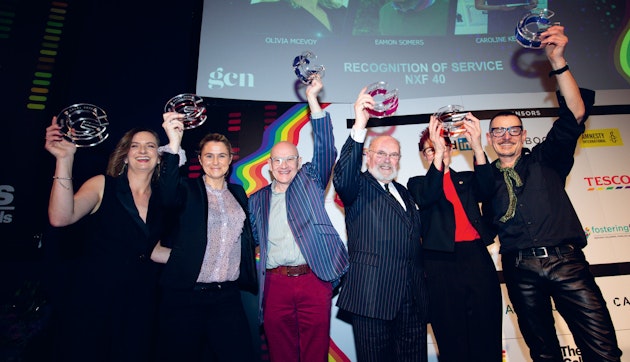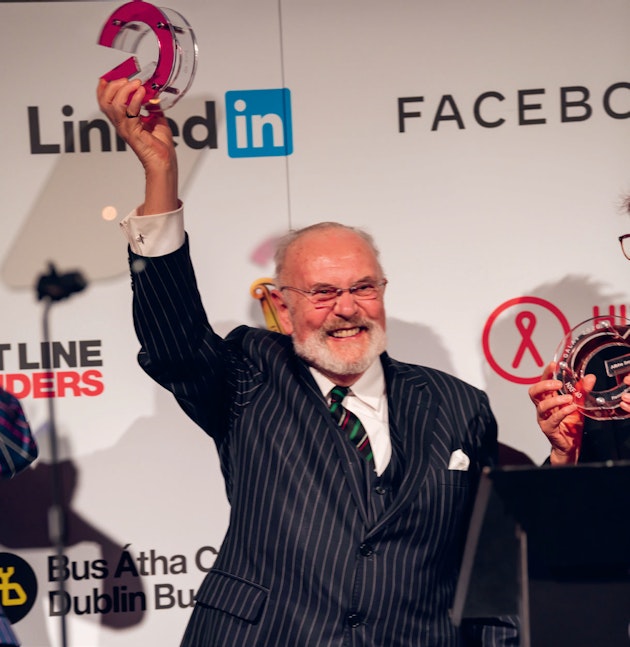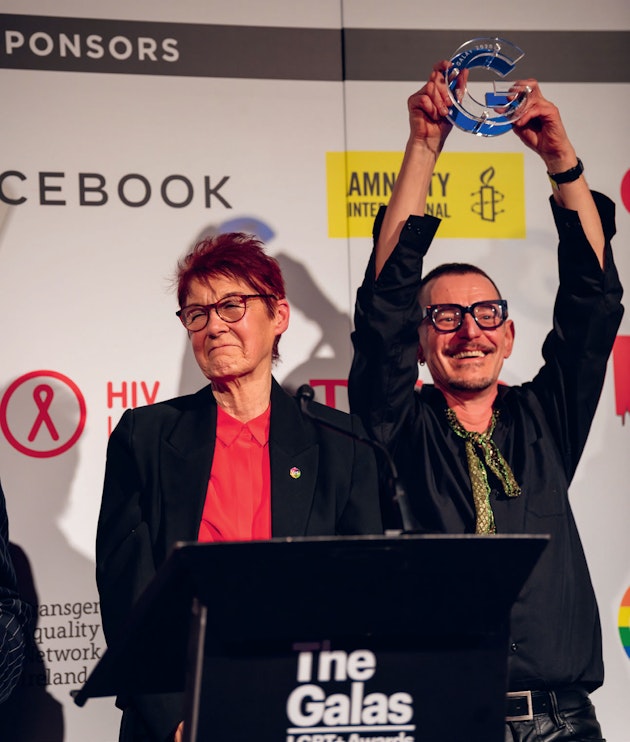12 mins
A Lifetime of Change
Under the shadow of Ireland’s anti-gay laws, the National LGBT Federation (NXF) emerged in 1979 as a way to unite the queer community and campaign for social justice. Taking root in the legendary Hirschfeld Centre, the organisation has grown immensely over the last 40 years. They are also the publishers of GCN - Ireland’s national LGBT+ news magazine.

Caroline Keane, Olivia McEvoy, Eamon Somers, Senator David Norris, Ailbhe Smyth, Tonie Walsh.
Photo by Julien Behal.
To commemorate their astounding victories for LGBT+ rights and social change, former and present chairs of the organisation were worthy recipients of the NXF40 Award.
Throughout the years, the NXF has undergone various changes to show full representation of the LGBT+ community. Originally it was known as the National Gay Federation (NGF), reflecting the ongoing legal battles for decriminalisation. In 1991, the name was changed to the National Lesbian and Gay Federation (NLGF). During February 2014, the group took on the title National LGBT Federation (NXF) as a moniker of inclusivity and diversity.
During her introductory speech at the GALAS, current chair of the NXF, Caroline Keane, said, “You make us, our wonderful community, what we are. We truly are a brilliant community and long may we flourish and continue to change the world.”
A home for the Irish LGBT+ movement
When Temple Bar was a far cry from the tourist destination it is today, the NGF leased a building on Fownes Street and titled it the Hirschfeld Centre. The venue became a crucial lifeline for queer people who suffered under the burden of Ireland’s restrictive laws, as the country’s first LGBT+ counselling helpline ‘Tel-A-Friend’ operated from the site.
The Hirschfeld Centre was a groundbreaking moment for the queer community, opening its doors on March 17, 1979, the space was home to a youth group, a small cinema and film club, a disco called Flikkers, and a cafe.
A commemorative plaque was placed outside the venue in June 2019 as part of Dublin City Council’s Commemorative Plaque Scheme. Before the unveiling ceremony, Lord Mayor of Dublin Paul McAuliffe said, “I am delighted to see this significant cultural centre have a commemorative plaque erected in the year of the 40th anniversary of its opening... It symbolises the vital importance of honouring and remembering the history and level of work that went into fighting for and achieving gay and civil rights.”
Rather than hiding away from the public eye, the NGF proudly declared their existence through the promotion of their new headquarters and LGBT+ social space. The venue’s was named after a self-proclaimed “Jewish, gay, and socialist sexologist”. Senator David Norris said, “When started the Hirschfeld Centre in 1979 deliberately named it after Magnus Hirschfeld in order to preserve the memory of this courageous man whose career had been largely obliterated by the Nazis.”
While Norris vehemently fought against the Irish State to decriminalise sex between gay men, he acted as the first chair and founder of the NGF. Speaking to Samuel Riggs for GCN’s The Year of The Activist 2019 Issue, the Senator described the burden attached to pioneering the gay liberation movement, “I suppose was really stressed at one stage but that was actually the thing that gave me the possibility of taking the action. I’d originally been in charge of the legal group in the Irish gay rights movement. That meant defending men who were found in compromising circumstances. We had a very good record, we won every single case.”

Senator David Norris.
Represented by Mary Robinson, Norris waged a lengthy legal battle against the State to change laws prohibiting homosexual activities. In 1988, the case was won and decriminalisation came into effect in 1993, under provisions signed by the Irish President at the time - Robinson once again. When years afterwards, Ireland would vote in favour of same-sex marriage, the NGF founder told the Irish Mirror, “It was the end of a very long process, a 40-year struggle, and to make that journey was quite extraordinary. There were no people out at all in my day, homosexuality was a word which would stop conversation in a polite society. was seen as a criminal and an outsider. To go from that to seeing everyone so happy – grandparents, husbands, wives, parents – is wonderful.”
After Norris stepped down, writer Eamon Somers became the second chair of the NGF and went on to set up the Tuesday Talkshops, which were held in the Hirschfeld Centre. He detailed the need for community engagement in GCN’s Health and Wellbeing 2019 Issue, “I thought in order for things to really change we had to develop a community. My belief was things like the Tuesday Talkshop would give people an opportunity to develop confidence and talk openly and argue positions. So that was the main purpose of it. That’s why call myself the ‘Transition President’, because it was [moving] from campaigning to more community development.”
Somers recalls negotiating with Gardai members in Pearse Street Garda Station over how they should approach the LGBT+ community after the tragic murder of Charles Self. During this time, there was a sense of societal unrest as queer people lived in fear of extreme homophobic acts while also suffering from the anxiety of being profiled by law enforcement. As the second chair noted, people were worried that information gathered could be released to civil servants screening job applicants.
During the year of 1982, months after Self’s death, Declan Flynn was brutally attacked and killed in Fairview park. His murder is viewed as the spark which ignited the LGBT+ Pride movement in Ireland. As Somers notes, “The community had changed quite a bit.”
From the oppressive and pervasive nature of these dark days, the LGBT+ community was mobilised to unite together. Somers’ vision of community development helped to carve out a space where people could come and openly share their stories.
Though the Hirschfeld Centre had to be closed after being badly damaged by fire in 1987, the memory of the building became the bedrock upon which the LGBT+ movement was built upon. It symbolised a sense of community, which would for years afterwards instigate phenomenal social change in Ireland.
Queering the Archive
Each chairperson of the NXF has brought to the position a new voice and direction, further working on what has come before while pushing forward in response to the changing needs of the LGBT+ community. While receiving the NXF40 Award, former chair of the NLGF Tonie Walsh said to those assembled at the GALAS, “We dreamed about you.”
Continuing the push for community development, the preservation of queer history became an integral part of the NXF’s identity. In 1980, a sub-group within the NLGF set out to gather and maintain documents and media clippings relating to LGBT+ people. This was the beginning of what would later develop into the Irish Queer Archive (IQA).
In December 1999, a working group of academics, historians, and writers were appointed to discuss the expansion of the Irish Queer Archive and a possible safe house for the material. Tonie Walsh, illustrated the need for the IQA, “The archive is about acknowledging the visibility and existence of lesbian/gay people.”

Ailbhe Smyth, Tonie Walsh.
The founding editor of Gay Community News (GCN) along with Catherine Glendon, Walsh, developed the IQA, working alongside University College Cork lecturer Dr Eibhear Walshe, RTÉ archivist Joan Murphy, librarian Elizabeth Kirwan, and two staff members of the Women’s Studies Department at University College Dublin; Dr Mary McAuliffe and Dr Katherine O’Donnell.
Through this initiative, the IQA developed into a living and thriving body of work, which continues to develop in harmony with the LGBT+ community. It acts as an ever expanding link between the past and present, to learn from previous generations in order to inform future activists, historians, artists, and members of the community. In 2008, the gathered information found a new home at the National Library of Ireland.
Celebrating the spirit of activism after the passing of same-sex marriage in Ireland, the National Library, GCN, the NXF, and Dialogue And Diversity presented ‘Road to Equality’- a display of numerous pieces from the IQA along with material from the archives of LGBT+ activist groups. The exhibition made a powerful statement on the importance of remembrance and sharing history.
Former chair of the NXF, Olivia McEvoy, spoke about the event’s significance, “The exhibition is an opportunity to acknowledge the courage and activism of those activists who helped reshape Ireland over the last 40 years. We are simultaneously acknowledging that this is but a stop on the ‘Road to Equality’ and that the legislative advances of 2015 merely give us a platform on which to build a wider culture of equality for both LGBT people and for all of Ireland; an Ireland where equality and diversity are truly championed and celebrated.”
In light of receiving the NXF40 award, McEvoy spoke about her love of the event and her hopes for the future, “The GALAS provide a deep well of pride in our diverse LGBT+ community and an energy to continue our efforts to champion equality through positive visibility and agitating for positive social change. We must also look beyond these shores and share that learning and stand in solidarity with those who continue to face discrimination on the grounds of sexual orientation and gender identity and we must address wider global challenges that are inextricably linked with equality and inclusion. Whether that’s climate change, gender inequality or income inequality, all of which intersect with our own community.”
The fight continues
The NXF and its chairs have tirelessly advocated for an Ireland where people can feel safe in expressing themselves, going beyond the position and carrying the legacy of the organisation into multiple successful campaigns. Former chair of the NLGF, Ailbhe Smyth, ran for 14 years before stepping down to be succeeded by McEvoy.
After her time on the board, she went on to become one of the key figures in the repeal movement, acting as Convenor of the Coalition to Repeal the Eighth. After the historic moment Ireland voted in favour of repeal on May 25, 2018, Smyth said, “My heart is full to the brim with pride and overflowing with pride and relief for women, for men, for Ireland. We have done ourselves proud. Thank you, thank you.”
Current Chair of the NXF, Caroline Keane, expressed the organisation’s overwhelming joy at the groundbreaking vote, “We are relieved and glad that the cruel Eighth Amendment has been lifted, which will allow Ireland to provide safer healthcare and support for women, trans and non-binary people when they most need help… We are another step towards a more compassionate, braver Ireland.”
Striving for an inclusive Ireland has been at the forefront of the NXF since its inception. The organisation has assisted the LGBT+ community throughout the fight for legislative recognition and consistently ensured these phenomenal achievements are memorialised to inspire further social change. Within this, the group has demonstrated a key understanding that there are many political areas still in need of further development, as highlighted by the launch of the survey Burning Issues 2 in 2015, focusing on “What’s next for LGBT Ireland and what’s important to you?”
Over 2,600 LGBT+ people and ten nationwide focus groups in seven cities and towns across Ireland took part in this survey. The findings showed an outcry from the community to see the Irish Government introduce hate crime legislation- which resonates to this day as homophobic attacks rise in the absence of legal protection. McEvoy said, “We have always known that recent legislative changes are only a platform for the culture we aspire to… Burning Issues 2 now makes it crystal clear that we still have a long journey to travel before we end sexual and gender oppression in Ireland.”
In November 2018, the NXF launched the report Far From Home: Life as an LGBT Migrant in Ireland, offering a harrowing look at the stories from migrants on the issues affecting them and a call to end the “immoral” system of Direct Provision. Mirroring the need for adequate hate crime legislation, 40 percent of respondents said they have experienced homophobic abuse and 54 percent felt they were excluded from Irish society. Through the organisation’s diligent work on these surveys and reports, it provides valuable tools for people to gain a more in-depth and informed outlook on the current societal and political landscape in Ireland, bringing voices to the fore that have been hidden for too long.
Celebrating the community
Community visibility has been an intrinsic part of the NXF as they find new and creative ways to acknowledge LGBT+ people and organisations who have made astonishing contributions to Irish society. In September 2009, the first GALAS were launched to celebrate these achievements and recognise the dedicated work which has brought about amazing social change. They have been running for years due to the dedicated work of the NXF and GCN, as current chair, Keane, highlights, “We have gained inspiration and affirmation from the GALAS, and we hope it will energise our community and allies to continue to work towards a fairer society for all marginalised groups.”
Former chair, McEvoy, described the feeling of being honoured at this years award ceremony, “As the ideator and one of the founders of the GALAS, they hold a very special place in my heart and have produced some very special moments over the years. Recognising the 40 year achievement of the NXF through inviting all of the Chairs to the GALAS stage certainly adds to that bursting bank of magical memories.”
Smyth further spoke about what it means to receive the NXF40 award and her pride in the adaptive powers of the NXF, “I was really very touched and very delighted to receive it. The NLGF was a really central part of my life for a very long time. Over that period of time, we have seen even the name of the organisation changing to reflect the evolving and changing nature of our communities. I suppose one of the things everyone should be really proud of is the fact that the NXF have managed to change, and managed to adapt, and to evolve along with the community. That’s very much to the credit of all the people who’ve been involved with it and in it over the years.”
From their early beginnings to the present day, the NXF have wholeheartedly embraced change, celebrated diversity, and developed platforms so everyone can feel visible in Irish society. When the organisation was announced as recipients of the Lifetime Achievement Award, the Mansion House erupted into joyous and much earned applause. Throughout 40 years of activism and advocacy, they have served as a pillar for the LGBT+ movement and will grow alongside the community towards a bright future.